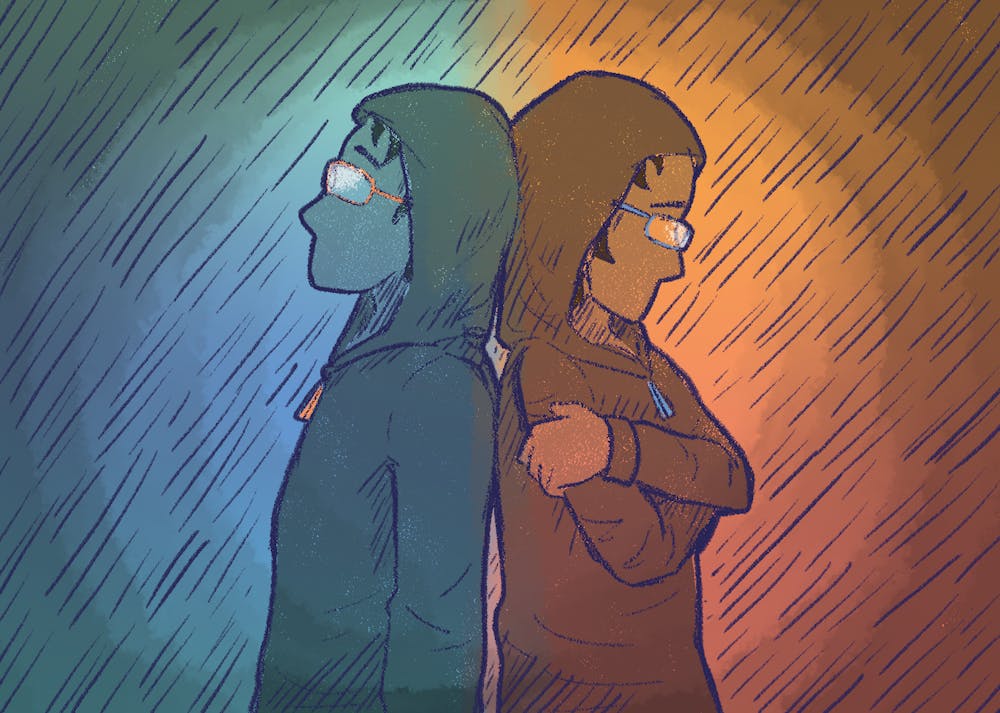I sent multiple texts to some of my friends one morning in June. They were short and to the point, setting the record straight about my sexuality and gender identity: This is my coming out.
While I’m hesitant to admit it, I’m coming out again, and it far from resembles anything you see in films like "Love, Simon," a film we're supposed to recognize as a teen romance. When Pride month began, video-streaming services like Netflix and Amazon Prime Video pushed out queer films to their front page for an LGBTQ+ showcase, of which "Love, Simon" took center stage.
But take it from us: "Love, Simon" far from represents an accurate queer experience as a whole.
Coming out is a matter of joy, though fear and anxiety can overshadow it. It’s a moment of decision where you let select people into your life to perceive you fully, honestly and unapologetically for who you are. But this doesn’t make it any less terrifying.
While "Love, Simon" was one of the first modern-day popular films that featured a gay teen romance, representation of LGBTQ+ characters is a little more complicated than throwing same-sex characters on screen and sprinkling in a kiss. Good representation supersedes outdated tropes — as a bare minimum — and gives the character a story that isn’t centered around the struggles of being gay. Plus, there are so many nuances and facets to account for in one's sexuality and gender identity that it can't be expected for queer people to come out just once to everyone in their lives.
Regardless of whether it’s a text or an in-person announcement, the queer experience is universal in the uncertainty, fear and hope that we feel when sharing this part of ourselves with the world. I’ve lost track of how many times I’ve come out to people. It kind of makes me feel like "the boy who cried wolf" at this point.
Every queer person weighs the potential risks, the cost that comes with being themselves in this day and age. It’s messy for some and easy for others. Some can let everybody in their lives know at once, while others struggle through quips from family members about marriage at holiday dinners or internalize being misgendered at extended family reunions. Coming out requires a person to consider their own mental, material and financial safety at the cost of having their lives turned on a dime, should their families not accept them.
As more high-profile people come out, including Carl Nassib, a defensive end for the Las Vegas Raiders, one of the most common responses that can be seen on social media is seemingly apathetic: “Who cares?” Not only is this quite telling about the seemingly anonymous parasocial voice the comment is attached to, this response also tries to gaslight the person coming out into believing their coming out is unimportant or unnecessary.
Regardless of one’s intention, “who cares?” is never the correct response to a queer person’s coming out. Not only does it invalidate a person’s struggles coming to terms with their identity, but it also tries to ignore the fact that heteronormativity is the current status quo — the idea that valid or normal romantic pairings only exist in heterosexual relationships.
It is the false notion that heterosexuality is the default people start from and discover their "otherness" in the form of queerness, which couldn’t be further from the truth. As people aren’t robots, there is no "default" setting for people, though this is how queer people are perceived.
Gay marriage, one of the biggest rights victories for queer people, was legalized just six years ago in the landmark Obergefell v. Hodges case. It is important to note, however, that this is far from equal rights. The validity of queer existence is still up in the air as of today and our right to exist is debated within the halls of government and the judiciary.
Queerness is also an experience made complicated by intersecting factors of one’s identity. Race, socioeconomic status and one's religion all affect one’s lived experience, regardless of whether they’re "out" or not.
Coming out is needed, especially among high-profile figures, to break away from heteronormativity and change the status quo. In turn, public discourse around the queer experience needs to shift in a way that fosters education and empathy rather than apathy.
Everyone, especially queer youth, should weigh the risks of coming out before doing so, but not let fear and shame consume their lives. Queerness is beautiful, natural and should be celebrated, fought for, liberated.
Reach the reporter at ssheptun@asu.edu and follow @SheptunovSonya on Twitter.
Like The State Press on Facebook and follow @statepress on Twitter.
Continue supporting student journalism and donate to The State Press today.

Sonya Sheptunov is a podcast producer at The State Press. They take an interest in data, counterculture, and all things nerdy. In their free time you can find them drinking too much coffee or attempting to crochet.




